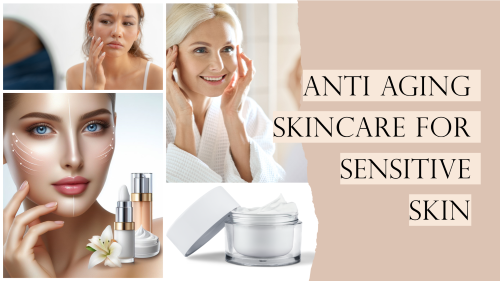In the pursuit of ageless beauty, individuals with sensitive skin face unique challenges that demand a tailored approach. Sensitive skin, characterized by its heightened reactivity, requires a specialized anti-aging skincare routine that balances effectiveness and gentleness. Navigating the world of anti-aging products can be daunting for those with sensitive skin, but with the right knowledge and a customized plan, achieving youthful and radiant skin is entirely feasible.
What is Anti-aging and How Does it Affect the Skin?

Understanding the aging process and its impact on the skin is crucial, especially when considering anti-aging skincare for sensitive skin. Aging is a natural and unavoidable process affecting everyone. The skin, being the body’s largest organ, undergoes noticeable changes over time.
One of the main factors that contribute to skin aging is the decrease in collagen and elastin, vital proteins for skin firmness and elasticity. As we age, our skin cells regenerate more slowly, leading to a thinner and less resilient epidermis. This makes the skin more prone to sagging, wrinkling, and uneven pigmentation.
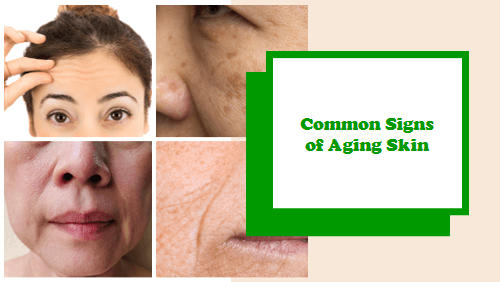
Some of the common signs of aging skin are:
- Wrinkles and Fine Lines: These result from a decrease in collagen and elastin, which causes the skin to lose its ability to bounce back from facial expressions and environmental stressors.
- Loss of Elasticity: The skin becomes saggy and less toned, as the underlying support structure weakens and gravity takes its toll.
- Uneven Pigmentation: Sun exposure over the years contributes to dark spots, freckles, and age spots, which develop more prominently due to reduced collagen and thinner skin.anti
Sensitive skin is particularly susceptible to these signs of aging, as it exhibits heightened vulnerability to UV rays and other environmental factors that can damage the skin. Sensitive skin also tends to have less natural moisture and oil, which can make it dry, dull, and flaky.
What are the Challenges of Anti-aging Skincare for Sensitive Skin?

Anti-aging skincare for sensitive skin introduces unique challenges that require special attention, such as:
- Heightened Sensitivity: Sensitive skin reacts strongly to environmental factors and skincare products. Traditional anti-aging ingredients, such as retinoids, alpha-hydroxy acids, and vitamin C, may cause irritation, redness, peeling, and inflammation.
- Risk of Allergies: Ingredients commonly found in anti-aging products, such as fragrances, preservatives, and certain acids, may trigger allergic reactions. Fragrances and harsh chemicals can be particularly problematic, as they can disrupt the skin’s natural barrier and cause further sensitivity.
- Balancing Act: Achieving effective anti-aging results without exacerbating sensitivity requires a delicate balance. Finding products that deliver results while being gentle becomes a priority. This may involve trial and error, as not all products work the same for everyone.
- Customized Approaches: Sensitive skin necessitates personalized anti-aging routines. Identifying specific triggers and addressing them individually is crucial for success. This may involve patch testing, reading labels, and consulting a dermatologist
What are the Characteristics of Sensitive Skin?
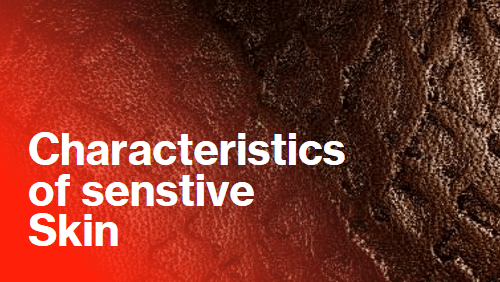
Sensitive skin is highly reactive and prone to redness, itching, and discomfort. It can be caused by genetic factors, underlying skin conditions, or external factors. Some of the characteristics of sensitive skin are:
- Often thinner and more delicate than other skin types.
- Prone to reactions from environmental factors and skincare products.
- Has a compromised skin barrier, which makes it more vulnerable to dehydration, infection, and inflammation.
- May have underlying skin conditions, such as rosacea, eczema, or psoriasis, that can worsen with age.
What are the Common Triggers for Sensitive Skin?
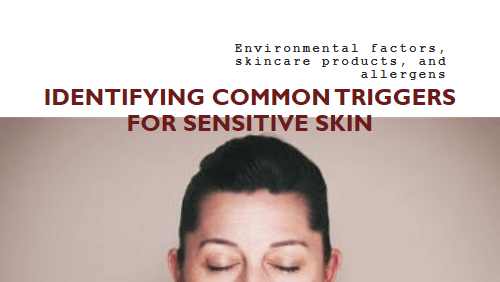
Sensitive skin can be triggered by a variety of factors, both internal and external. Some of the common triggers for sensitive skin are:
- Environmental Factors: Exposure to harsh weather conditions, such as extreme temperatures, wind, and humidity, can dry out and irritate the skin. Pollution, dust, and smoke can also clog pores and cause inflammation. Sun exposure is one of the most damaging factors, as it can cause premature aging, sunburn, and skin cancer.
- Skincare Products: Ingredients such as fragrances, preservatives, alcohol, sulfates, and certain acids can irritate and strip the skin of its natural oils and moisture. Overusing or misusing skincare products can also cause sensitivity, such as scrubbing too hard, using too many products, or applying them incorrectly.
- Allergens: Pollen, pet dander, dust mites, and other allergens in the environment can trigger allergic reactions in the skin, such as rashes, hives, and swelling. Food allergies can also cause skin reactions, such as flushing, itching, and breakouts.
Why is it Important to Identify Personal Triggers for Sensitive Skin?
Individual variations. Personalized care. Avoiding irritants
Identifying personal triggers for sensitive skin is important for several reasons, such as:
- Individual Variations: Triggers can vary significantly from person to person, depending on their skin type, condition, and history. What works for one person may not work for another, and vice versa.
- Personalized Care: Understanding personal triggers allows for a customized anti-aging skincare routine that suits the individual’s needs and preferences. This can help avoid unnecessary irritation and achieve optimal results.
- Avoiding Irritants: Identifying and avoiding specific triggers minimizes the risk of adverse reactions and further damage to the skin. This can help preserve the skin’s health and appearance.
In the context of anti-aging skincare for sensitive skin, recognizing the nuances of sensitivity and personal triggers lays the foundation for a targeted and effective skincare approach.
How to Tailor Effective Anti-aging Skincare for Sensitive Skin?
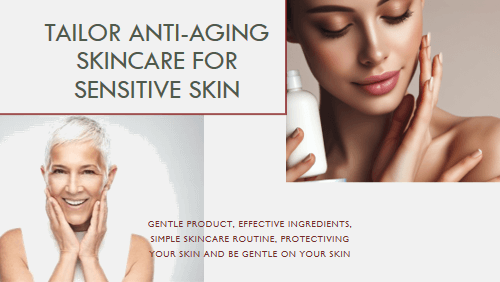
Tailoring effective anti-aging skincare for sensitive skin involves choosing the right products, ingredients, and techniques that suit the individual’s skin type and concerns.
Here are some general tips and recommendations:
1) Choose Gentle Products
Look for products that are specifically formulated for sensitive skin, or that have gentle, natural, and hypoallergenic ingredients.
Avoid products that contain fragrances, alcohol, sulfates, and other potential irritants. Read labels carefully and do a patch test before using a new product.
2) Use Effective Ingredients
Look for ingredients that have proven anti-aging benefits, such as hyaluronic acid, niacinamide, peptides, antioxidants, and sunscreen.
These ingredients can help hydrate, brighten, firm, and protect the skin, without causing irritation.
3) Follow a Simple Routine
Keep your skincare routine simple and consistent, using only the products that you need and that work for you.
A basic routine should include a gentle cleanser, a moisturizer, and a sunscreen in the morning, and a cleanser, a serum, and a moisturizer at night.
You can also add an exfoliant and a mask once or twice a week, depending on your skin’s tolerance.
4) Be Gentle with Your Skin
Avoid scrubbing, rubbing, or pulling your skin, as this can cause irritation and damage. Use gentle circular motions and pat your skin dry with a soft towel.
Apply your products in thin layers and wait for them to absorb before applying the next one.
Avoid using hot water, as this can dry out and inflame your skin. Use lukewarm water instead.
5) Protect Your Skin from the Sun
Sun exposure is one of the main causes of skin aging and sensitivity, so it is essential to protect your skin from the sun’s harmful rays.
Use a broad-spectrum sunscreen with at least SPF 30 every day, and reapply every two hours or after sweating or swimming.
Wear protective clothing, such as hats, sunglasses, and long sleeves, and avoid the sun during peak hours, from 10 a.m. to 4 p.m.
How Aging Affects Sensitive Skin Differently
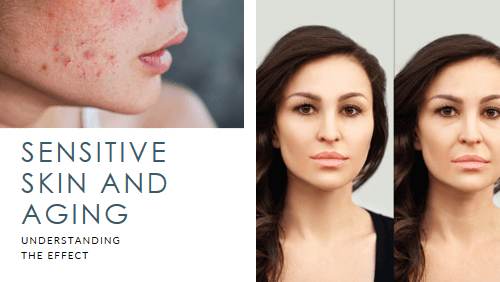
Aging affects everyone’s skin differently, but sensitive skin tends to show more signs of aging and experience more challenges. Some of the ways that aging affects sensitive skin differently are:
· Thinning Skin: Sensitive skin tends to thin more rapidly with age, making it more fragile and prone to damage. Thinner skin also means less protection from external factors and more visible blood vessels, which can cause redness and flushing.
· Reduced Collagen Production: Aging in sensitive skin results in a quicker decline in collagen levels, which are essential for skin firmness and elasticity. Reduced collagen production leads to sagging, wrinkling, and loss of volume in the skin.
· Impaired Barrier Function: The skin’s protective barrier weakens with age, making it more susceptible to irritants, allergens, and infections. Impaired barrier function also causes more moisture loss, which can result in dryness, flaking, and cracking.
Increased Susceptibility to Environmental Factors in Sensitive Skin
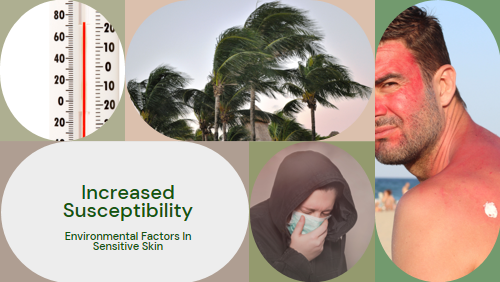
Sensitive skin reacts more strongly to harsh environmental factors, such as sun exposure, pollution, temperature changes, and wind. These factors can cause inflammation, irritation, and oxidative stress, which can accelerate skin aging and worsen existing signs of aging.
Some of the environmental factors that affect sensitive skin are:
1) Sun Exposure
Sun exposure is one of the main causes of skin aging and sensitivity, as it can cause premature aging, sunburn, and skin cancer.
Sun exposure damages the skin’s DNA, collagen, and elastin, leading to wrinkles, pigmentation, and loss of firmness.
Sun exposure also triggers the production of histamine, which causes itching, redness, and swelling in sensitive skin.
2) Pollution
Pollution exposes the skin to free radicals, which are unstable molecules that damage the skin’s cells and proteins.
Free radical damage causes oxidative stress, which contributes to skin aging and inflammation. Pollution can also clog pores and cause breakouts, dullness, and sensitivity.
3) Temperature Changes
Temperature changes can affect the skin’s blood flow, moisture levels, and oil production. Extreme heat can cause vasodilation, which increases blood flow and causes flushing and rosacea flare-ups.
Extreme cold can cause vasoconstriction, which reduces blood flow and causes pale and dry skin. Temperature changes can also affect the skin’s hydration and sebum balance, leading to dryness, oiliness, or combination skin.
4) Wind
Wind can strip the skin of its natural oils and moisture, causing dryness, flaking, and irritation. Wind can also carry dust, dirt, and allergens, which can clog pores and trigger allergic reactions in sensitive skin.
Importance of Protective Measures for Sensitive Skin
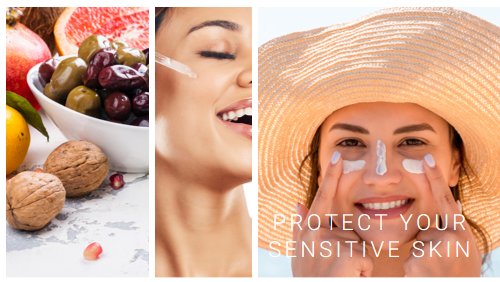
Sensitive skin requires enhanced protection against environmental stressors, as they can worsen skin aging and sensitivity.
Some of the protective measures that sensitive skin needs are:
1) Sun Protection
Sun protection is the most important measure for preventing and reversing skin aging and sensitivity.
Sun protection involves using a broad-spectrum sunscreen with at least SPF 30 every day, and reapplying every two hours or after sweating or swimming.
Sun protection also involves wearing protective clothing, such as hats, sunglasses, and long sleeves, and avoiding the sun during peak hours, from 10 a.m. to 4 p.m.
2) Antioxidant Protection
Antioxidant protection is another important measure for combating skin aging and sensitivity.
Antioxidants are substances that neutralize free radicals and prevent oxidative stress. Antioxidants can be found in foods, such as fruits, vegetables, nuts, and seeds, and in skincare products, such as serums, creams, and masks.
Antioxidants can help brighten, smooth, and firm the skin, as well as reduce inflammation and sensitivity.
Some examples of antioxidants that are beneficial for sensitive skin are vitamin C, vitamin E, niacinamide, and green tea.
3) Barrier Repair
Barrier repair is a vital measure for restoring and maintaining skin health and resilience. Barrier repair involves using gentle and hydrating products that replenish the skin’s natural oils and moisture, and strengthen the skin’s protective barrier.
Barrier repair can help prevent moisture loss, irritation, and infection, as well as improve skin texture and tone.
Recognizing the distinct impact of aging and fortifying against environmental factors becomes paramount for maintaining skin health and vitality.
Components of an Anti-Aging Skincare Routine
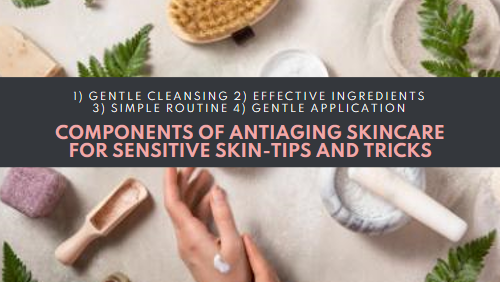
An effective anti-aging skincare routine for sensitive skin should include the following components:
1) Gentle Cleansing
Cleansing is the first and most important step of any skincare routine, as it removes dirt, oil, makeup, and impurities from the skin.
However, cleansing can also strip the skin of its natural oils and moisture, causing dryness and irritation. Therefore, it is important to choose a gentle, fragrance-free, and mild cleanser that cleanses the skin without triggering sensitivity.
2) Effective Ingredients
After cleansing, the skin is ready to absorb the active ingredients that can help address the signs of aging and sensitivity.
Effective ingredients are those that have proven anti-aging benefits, such as hyaluronic acid, niacinamide, peptides, antioxidants, and physical blockers for sunscreen such as zinc or titanium dioxide.
These ingredients can help hydrate, brighten, firm, and protect the skin, without causing irritation.
3) Simple Routine
A simple and consistent routine is the best way to achieve optimal results for sensitive skin.
Such routine should consist of the following steps:
- Gentle cleanser: Cleanse your skin with a gentle, fragrance-free cleanser that won’t strip your skin of its natural oils and moisture.
- Toner: Apply a toner that balances your skin’s pH level and prepares it for the next steps.
- Exfoliant (optional): Exfoliate your skin once or twice a week with a very gentle exfoliant that removes dead skin cells and improves skin texture. You can skip this step if your skin is too sensitive or irritated.
- Serum: Apply a serum that contains effective ingredients for your skin concerns, such as hydration, brightening, or firming. Choose a serum that is suitable for sensitive skin and doesn’t contain harsh chemicals or fragrances.
- Moisturizer: Moisturize your skin with a moisturizer that locks in moisture and nourishes your skin. Choose a moisturizer that is suitable for your skin type and doesn’t clog your pores or cause breakouts.
- Sunscreen: Protect your skin from the sun with a broad-spectrum sunscreen with at least SPF 30. Choose a sunscreen that is suitable for sensitive skin and doesn’t cause irritation or allergic reactions.
- Night Cream: At night, you can use a night cream that helps repair and regenerate your skin while you sleep. You can opt for a night cream that contains soothing ingredients, such as chamomile or calendula, to calm your skin and reduce inflammation.
A simple routine can also be customized according to the individual’s skin type, concerns, and preferences.
· For example, a person with dry and sensitive skin may need to add a hydrating serum or a richer moisturizer, while a person with oily and sensitive skin may need to use a lighter moisturizer or a mattifying primer.
A simple routine should also avoid using too many products or ingredients that can overwhelm or irritate the skin.
4) Gentle Application
The way the products are applied can also affect the skin’s sensitivity and aging.
It is important to be gentle with the skin, avoiding scrubbing, rubbing, or pulling, as this can cause irritation and damage. Instead, use gentle circular motions and pat the skin dry with a soft towel.
Apply the products in thin layers and wait for them to absorb before applying the next one.
Avoid using hot water, as this can dry out and inflame the skin. Use lukewarm water instead.
When it comes to anti-aging skincare for sensitive skin, a gentle cleansing routine forms the foundation, ensuring efficacy without compromising skin sensitivity.
Fragrance-free cleansers prevent skin irritation.
Mild formulations preserve the skin’s natural balance without triggering sensitivity.
Why You Should Avoid Harsh Ingredients on Sensitive Skin
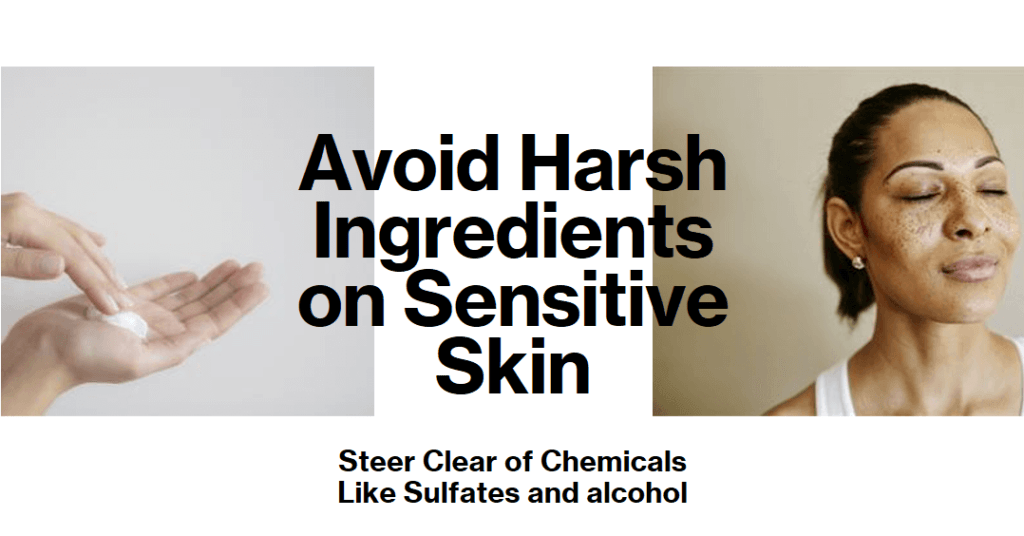
Steer clear of harsh chemicals like sulfates and alcohol.
Gentle, non-abrasive cleansers safeguard against irritation and maintain skin health.
When it comes to anti-aging skincare for sensitive skin, a gentle cleansing routine forms the foundation, ensuring efficacy without compromising skin sensitivity.
Lifestyle Factors for Anti-Aging Skincare for Sensitive Skin
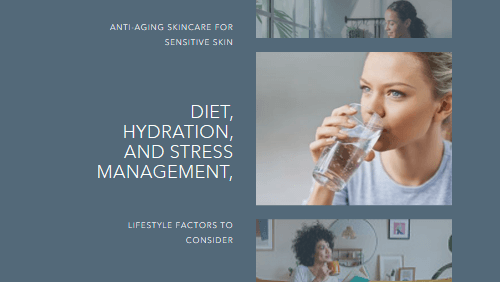
Elevating your skincare game involves embracing a holistic lifestyle approach.
Lifestyle Factors for Anti-Aging Skincare for Sensitive Skin
Elevating your skincare game involves embracing a holistic lifestyle approach. Skincare products alone are not enough to prevent and reverse skin aging and sensitivity. Lifestyle factors, such as diet, hydration, and stress management, also play a significant role in influencing the skin’s health and appearance. Here’s a quick breakdown of some lifestyle factors for anti-aging skincare for sensitive skin:
1) Importance of a Healthy Diet for Skin Health
A healthy diet can support skin regeneration and repair, as well as provide antioxidants and anti-inflammatory nutrients.
A healthy diet should include a variety of fruits, vegetables, whole grains, lean proteins, healthy fats, and water. Some of the foods that are especially beneficial for sensitive skin are those that contain omega-3 fatty acids, such as fish, flaxseeds, and walnuts.
Omega-3 fatty acids help promote skin elasticity, reduce inflammation, and protect the skin from sun damage.
2) Adequate Hydration and Its Impact on Sensitive Skin
Hydration is essential for keeping the skin plump, smooth, and supple. Hydration can come from both within and outside. Drinking sufficient water enhances skin hydration from within, as water helps flush out toxins, deliver nutrients, and regulate body temperature.
Moisturizing practices complement internal hydration from outside, as moisturizers help lock in moisture, prevent transepidermal water loss, and restore the skin’s barrier. Hydration is especially crucial for sensitive skin, as it can help prevent dryness, flaking, and cracking, which can worsen skin aging and sensitivity.
3) Stress Management Techniques to Minimize Skin Reactivity
Stress can have a negative impact on the skin, as it can trigger the release of hormones, such as cortisol, that can cause inflammation, breakouts, and sensitivity.
Stress can also affect the skin’s blood flow, moisture levels, and collagen production, leading to dullness, dryness, and loss of firmness in the skin.
Therefore, it is important to adopt stress management techniques that can help reduce skin reactivity and promote skin health
Therefore, it is important to adopt stress management techniques that can help reduce skin reactivity and promote skin health.
Some of the stress management techniques that can benefit sensitive skin are:
· Mind-Body Practices: Mind-body practices, such as meditation, yoga, tai chi, and breathing exercises, can help calm the mind, relax the body, and lower cortisol levels. These practices can also improve blood circulation, oxygen delivery, and skin hydration, as well as enhance skin repair and regeneration.
· Prioritizing Sleep: Quality sleep is essential for skin health, as it allows the skin to rest, recover, and rejuvenate. During sleep, the skin produces more collagen and elastin, which help maintain skin elasticity and firmness. Sleep also helps balance the skin’s moisture and pH levels, which can prevent dryness and irritation. Moreover, sleep helps regulate the immune system, which can protect the skin from infections and inflammation.
· Seeking Professional: Help: Sometimes, stress can be overwhelming and difficult to manage on one’s own. In such cases, it may be beneficial to seek professional help from a therapist, counselor, or coach, who can provide guidance, support, and coping strategies. Professional help can also help address any underlying psychological issues that may contribute to stress, such as anxiety, depression, or trauma.
According to a 2019 study, psychological interventions, such as cognitive behavioural therapy, mindfulness-based therapy, and hypnosis, can improve skin conditions such as psoriasis, eczema, acne, by reducing stress and enhancing coping skills
In the context of anti-aging skincare for sensitive skin, managing stress effectively can help prevent and reverse skin aging and sensitivity, as well as improve skin health and well-being.
Specialized Treatments for Sensitive Skin
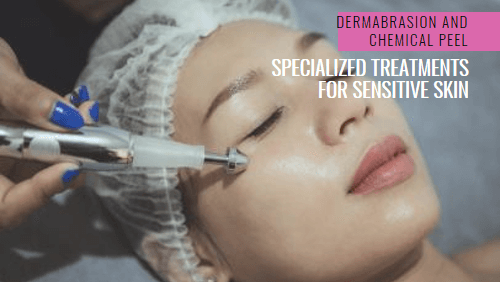
Enhancing your anti-aging skincare routine involves considering specialized treatments with sensitivity in mind. These treatments can help improve the appearance and texture of the skin, as well as reduce the signs of aging and sensitivity.
However, they should be done under professional guidance and with caution, as they can also cause irritation or damage if not done properly.
These specialized professional treatments are dermatologist approved procedures:
Dermabrasion
This is a procedure that removes the outer layers of the skin, improving its texture and reducing scars, wrinkles, and pigmentation.
Dermabrasion is done with a rotating device that abrades the skin with fine crystals or a diamond tip.
Dermabrasion can be effective for sensitive skin, as it can help remove dead skin cells, unclog pores, and stimulate collagen production.
However, dermabrasion can also cause redness, swelling, and infection, so it should be done by a qualified dermatologist and followed by proper aftercare.
Chemical Peels
This is a procedure that applies a chemical solution to the skin, causing it to peel off and reveal a new layer of skin.
Chemical peels can address fine lines, wrinkles, sun damage, and uneven skin tone.
Chemical peels can be done in different strengths, from mild to deep, depending on the skin’s condition and desired results.
Chemical peels can benefit sensitive skin, as they can help exfoliate, brighten, and smooth the skin.
However, chemical peels can also cause stinging, burning, peeling, and infection, so they should be done by a qualified dermatologist and followed by proper aftercare.
DIY Treatments For Sensitive Skin at Home
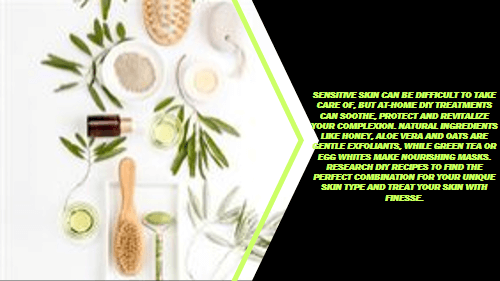
If you prefer to do your own treatments at home, you can also try some DIY options that are gentle and natural for sensitive skin. These treatments can help nourish, hydrate, and soothe the skin, as well as enhance your daily skincare routine. However, you should also be careful when trying new ingredients or products, as they may cause allergic reactions or irritation.
Here are some DIY treatments for sensitive skin that you can try at home:
Gentle Exfoliation
Homemade exfoliants using natural ingredients can provide mild exfoliation for sensitive skin, removing dead skin cells and improving skin texture.
Some examples of gentle exfoliants for sensitive skin are:
1) Oatmeal Exfoliant
Oatmeal has anti-inflammatory and soothing properties, making it ideal for sensitive skin. Oatmeal can also help moisturize and soften the skin, as well as balance the skin’s pH level.
To make an oatmeal exfoliant, you can mix 1/4 cup of ground oatmeal with 2 tablespoons of honey and 2 tablespoons of plain yogurt. Apply the mixture to your face and gently massage in circular motions.
Rinse off with warm water and pat dry..
2) Brown Sugar
Brown sugar is a natural humectant, meaning it draws moisture from the air and retains it in the skin.
Brown sugar can also help exfoliate and brighten the skin, as well as stimulate blood circulation.
To make a brown sugar exfoliant, you can mix 1/4 cup of brown sugar with 2 tablespoons of coconut oil or olive oil. Apply the mixture to your face and gently massage in circular motions.
Rinse off with warm water and pat dry.
DIY Masks
Sensitive skin-friendly masks with natural ingredients can help hydrate, calm, and repair the skin, as well as address specific skin concerns.
Some examples of DIY masks for sensitive skin are:
1) Aloe Vera
Aloe vera is a well-known ingredient for soothing and healing the skin, especially for sunburns, wounds, and inflammation.
Aloe vera can also help hydrate and plump the skin, as well as reduce redness and irritation.
To make an aloe vera mask, you can simply apply pure aloe vera gel to your face and leave it on for 15 to 20 minutes.
Rinse off with cool water and pat dry.
3) Chamomile
Chamomile is a herb that has anti-inflammatory and antioxidant properties, making it ideal for sensitive skin.
Chamomile can also help reduce stress and promote relaxation, which can benefit the skin as well.
To make a chamomile mask, you can steep 2 chamomile tea bags in hot water for 10 minutes. Then, squeeze out the excess water and place the tea bags on your eyes.
You can also soak a cotton pad or a cloth in the chamomile tea and apply it to your face. Leave it on for 15 to 20 minutes.
Rinse off with cool water and pat dry.
Caution Against Aggressive Treatments That May Harm Sensitive Skin
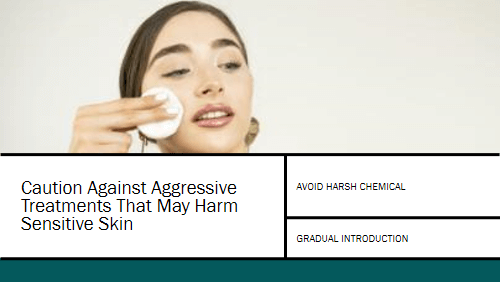
While some treatments can be beneficial for sensitive skin, others can be harmful and should be avoided or used with caution.
Some caution to be aware of when looking for a treatment if you have sensitive skin include:harm sensitive skin are:
1) Avoid Harsh Chemicals
Steer clear of aggressive acids and abrasive exfoliants, such as glycolic acid, salicylic acid, and microbeads.
These ingredients can strip the skin of its natural oils and moisture, causing dryness, flaking, and irritation.
They can also disrupt the skin’s natural barrier and pH balance, making it more prone to infections and inflammation.
If you do use these ingredients, use them sparingly and infrequently, and always follow with a moisturizer and sunscreen.
2) Gradual Introduction
Exercise caution when introducing new treatments to your sensitive skin, whether they are DIY or professional.
Always do a patch test on a small area of your skin before applying the treatment to your entire face. Wait for at least 24 hours to see if there are any adverse reactions, such as redness, itching, burning, or swelling.
If there are no reactions, you can proceed with the treatment, but start with a low concentration or a short duration, and gradually increase as your skin tolerates.
If there are any reactions, discontinue the treatment and consult a dermatologist.
Specialized treatments require a balanced approach, embracing both professional expertise and gentle at-home practices.
By choosing the right treatments for your sensitive skin, you can enhance your anti-aging skincare routine and achieve healthy, youthful, and resilient skin.
Building a Personalized Routine for Sensitive Skin
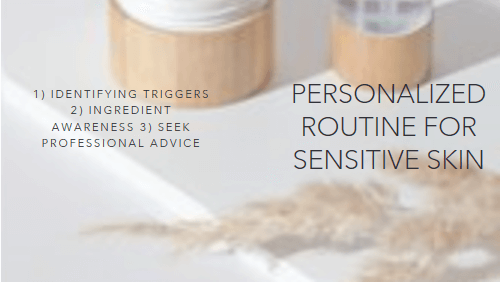
Creating a personalized anti-aging skincare routine for sensitive skin is empowering, as it allows you to choose the best products, ingredients, and treatments for your skin type and concerns.
However, building a personalized routine can also be challenging, as it requires a lot of research, trial and error, and professional advice.
Here’s a guide to help you build your own routine for sensitive skin.
1) Identifying Triggers
The first step to building a personalized routine is to recognize your individual sensitivity triggers, which are the factors that cause your skin to react negatively.
These triggers can be internal, such as genetics, hormones, or allergies, or external, such as environmental factors, skincare products, or stress. Identifying your triggers can help you avoid or minimize them, as well as choose the products and treatments that suit your skin’s needs and preferences.
For example, if you have sensitive skin due to rosacea, you may want to avoid products that contain alcohol, sulfates, or fragrances, and opt for products that contain soothing ingredients, such as aloe vera, chamomile, or green tea.
2)Ingredient Awareness
The second step to building a personalized routine is to be mindful of the ingredients that you use on your skin, as they can have a significant impact on your skin’s health and appearance.
You should always read the labels carefully and look for ingredients that have proven anti-aging benefits, such as hyaluronic acid, niacinamide, peptides, antioxidants, and sunscreen.
These ingredients can help hydrate, brighten, firm, and protect your skin, without causing irritation.
You should also avoid or use with caution ingredients that are known to be harsh, drying, or sensitizing, such as alcohol, sulfates, and certain acids.
If you are unsure about an ingredient, you can always do a patch test on a small area of your skin before applying it to your entire face, and wait for at least 24 hours to see if there are any adverse reactions.
3) Seeking Professional Advice for Personalized Skincare Plans
The third step to building a personalized routine is to seek professional advice from a dermatologist, who can provide you with personalized guidance and customized plans for your sensitive skin.
A dermatologist can help you diagnose the underlying causes of your skin sensitivity, recommend the best products, ingredients, and treatments for your skin type and concerns, and monitor your skin’s progress and adjust your skincare plan accordingly.
A dermatologist can also offer you specialized treatments, such as dermabrasion, chemical peels, or laser therapy, that can help improve the appearance and texture of your skin, as well as reduce the signs of aging and sensitivity.
However, these treatments should be done under professional supervision and with proper aftercare, as they can also cause irritation or damage if not done properly.s
Conclusion: Create an Effective Anti-Aging Skincare Routine
Sensitive skin requires extra care and attention, especially when it comes to aging. Aging and environmental factors can affect sensitive skin. If you have sensitive skin, you must understand how to create a skincare routine that addresses these issues. Your lifestyle habits can help improve your skin health, as well as the ingredients and treatments that you should avoid or use carefully. Finally, you should seek professional guidance from a dermatologist. Remember, the best anti-aging skincare routine for sensitive skin is the one that works for you. Don’t hesitate to experiment and seek expert advice to achieve your skin goals.
